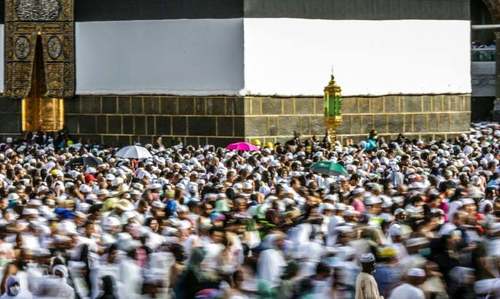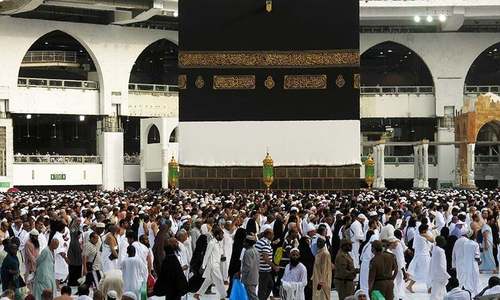
A report by the Association of Chartered Certified Accountants (ACCA), on July 1, 2018, quotes a Saudi official stating that Saudi Arabia earns a revenue of up to 16 billion dollars every year from hosting Haj pilgrims from around the world.
The annual Islamic pilgrimage, to the city of Makkah in Saudi Arabia, has often been subsidised and financially facilitated by governments in Muslim-majority countries. Haj is one of the five pillars of Islam and mandatory for those who can afford it. Performing Haj is obviously easier for those who have the financial means to do so, but many others in Muslim-majority regions have always depended on the heavy travel and logistical subsidies provided under their government’s Haj policies.
Unlike producer/production subsidies that are often extended to businesses in a bid to prop them up, Haj subsidies are part of what are called consumer/consumption subsidies. These are fixed by governments to make certain products and services affordable to a large number of people.
But policies related to the latter are decisively influenced by the political orientation of a government, and especially, by the economic conditions of a country. So these policies are always likely to fluctuate.
In February 2019, facing an intricate economic crisis, the government of Pakistan announced that it was going to reduce the subsidies provided to Haj pilgrims. Whereas some economic experts welcomed the move, by stating that an economically-challenged country could not afford to continue providing consumer/consumption subsidies, there was unease in the more religious political circles.
The history of state subsidies for performing Haj is not ‘centuries-old’ as some woud have us believe. But governments are loathe to bell the cat
On February 11 this year, the government announced that because of the economic crisis, it was curtailing Haj expenses ‘to the maximum extent’. This means far less Pakistanis will be able to perform the annual pilgrimage. Members of some religious parties criticised the move. One critic pointed out that the move was against the ‘centuries-old tradition’ of governments facilitating their peoples’ desire to perform Haj.
In fact, this facility is not at all ‘centuries-old’. In his essay for the anthology The Islamic Connection: South Asia And The Gulf, French political scientist Christophe Jaffrelot writes that the Sultans of the Delhi Sultanate and the Mughals invested more in encouraging local Muslims to visit Sufi shrines than perform Haj, despite Mughal India being an economic power.

Jaffrelot adds that, even though the third Mughal ruler Akbar finally decided to facilitate pilgrimages to Makkah by providing three ships, no Mughal king went on Haj. Ironically, only their opponents were forcibly exiled to Makkah and Madina.
Jaffrelot writes that the Mughals, in fact, had a contemptuous relationship with the keepers of Makkah because the latter questioned the authenticity of the former’s faith. That’s why some Mughals debarred people from visiting Makkah for Haj. Even a gift of 600,000 rupees by the more ‘pious’ Mughal emperor Aurangzeb was rejected by the keepers of Makkah.
In his book Guests of God, political scientist Robert R. Bianchi writes that the huge growth in the number of people performing Haj is a recent phenomenon. The data that he uses demonstrates that, before the 1950s, the number of overseas Haj pilgrims rarely topped 100,000, whereas presently it is over one million every year. The Haj, as we know it today, largely began to develop from the mid-1970s.
Bianchi writes that the development of faster and safer modes of travel and international crises of lesser intensity compared to the ones that emerged before the 1950s, were the reasons behind the increase of overseas pilgrims. Also, Saudi Arabia became more proactive in popularising Haj after it enjoyed a windfall with the price of its oil products, experiencing a massive increase in 1973 and onwards.
From less than 100,000, in the late 1940s, the annual number of overseas Haj pilgrims to Saudi Arabia rose to around 800,000 in 1980, and 1,400,000 in 2005. This is why a Muslim-majority country facing an economic crisis now approaches the issue of Haj subsidies somewhat differently than before. Before the 1960s, governments in Muslim-majority countries would not hesitate to curtail Haj expenses or even stop people from performing Haj.
They would cite economic problems and couple this by reminding fellow Muslims that Haj was mandatory only for those who could afford it. For example, author and historian Zekeriya Kursun, in his essay for Turkish daily Yeni afak, writes that from the time of the formation of the modern Turkish Republic by Kemal Ataturk in the early 1920s, till the late 1940s, very few Turks travelled to Saudi Arabia to perform Haj.
According to Kursun, the Turkish government, in need of foreign exchange and savings, did not spend anything on Haj. But from the late 1950s, as the country’s economic health somewhat improved, the Turkish government slowly began to lift restrictions on Haj. It wasn’t until 1974 that a Haj committee was formed to facilitate Turkish pilgrims.
In Pakistan, the aforementioned ‘centuries-old tradition’ Haj policies are actually no more than 47 years old.
According to Bianchi’s data, as a new country and small economy, the government(s) of Pakistan in the 1950s and 1960s concentrated on accumulating capital and saving foreign exchange. This meant only scant Haj subsidies. Therefore, less than 20,000 Pakistanis performed Haj in 1955, and this figure did not rise till the early 1970s. In fact the figure dropped to approximately 15,000 in 1966.
The number of pilgrims travelling to perform Haj witnessed a massive spike in 1973 during the Z.A. Bhutto government when the populist regime drastically loosened the previous Haj policies. The government set up a separate Haj directorate and began to heavily subsidise Haj travel.
Thousands of Pakistanis who could not have afforded to perform the Haj till the 1960s, were now able to do so. Bianchi writes that the Bhutto regime did this to get close to Saudi Arabia’s growing status as an oil power and to attract voters from Pakistan’s more conservative constituencies.
But Bianchi adds that this exercise — later adopted by every other Pakistani ruler, and fortified by rulers undertaking the pilgrimage (albeit on state expense) — has never been a vote-getter as such. He gives the example of how constituencies that benefitted the most from Bhutto’s Haj policies were the ones that enthusiastically participated in the right-wing protest movement against him in 1977.
Bhutto also encouraged rulers to be photographed while on Haj. The practice is sheer political exhibitionism that Pakistani rulers indulge in. But Bhutto’s message to the people was: “Now you too can perform Haj, with my help.”
While the current government is correct in curtailing Haj subsidies in the face of an economic crisis, the PM and his ministers should have set an example, instead of flying out to perform the Haj on state expense, and then returning to tell the people, ‘Sorry, the economy can’t afford to help you perform it too.’
Published in Dawn, EOS, February 23rd, 2020













































